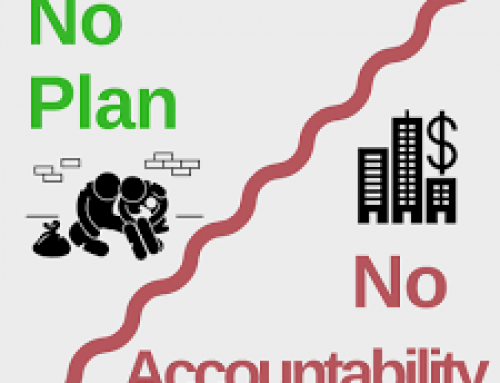Good news and bad news: Section 702 of the FISA is temporarily dead!
December 25, 2017
By: Bobby Casey, Managing Director GWP
 The US Federal Government can’t give you the straight good news of letting Section 702 of the FISA (Federal Intelligence Surveillance Act) just expire one and for all; it left itself a little opening to revisit it by saying it’d dead “for now”. What does that mean for the average person in the USA? It means that for now, the NSA and FBI will ease up on taking jackhammers to your 4th Amendment rights.
The US Federal Government can’t give you the straight good news of letting Section 702 of the FISA (Federal Intelligence Surveillance Act) just expire one and for all; it left itself a little opening to revisit it by saying it’d dead “for now”. What does that mean for the average person in the USA? It means that for now, the NSA and FBI will ease up on taking jackhammers to your 4th Amendment rights.
But if Christmas means just punting this thing down the road, does the 2018 New Year mean bringing it back? This was supposed to expire on December 31, 2017, but congress bought a little extra time to January 19th, 2018. BUT, the Trump administration believes they have until mid-April 2018.
There is a little glitch in the rigging of the FISA: “Under the law, about once a year, the secretive Foreign Intelligence Surveillance Court sets rules for the program and authorizes it to operate for 12 months.” If this is the case, then the last time the FISC issued a certification was April 26th, 2017.
Whether there’s a few days, a few weeks, or a few months, this issue isn’t going away, so keep this at the forefront.
Two important things to know about Section 702 of the FISA are:
- Your 4th Amendment right isn’t a positive right to anything. It’s a negative right against the government: “The right of the people to be secure in their persons, houses, papers, and effects, against unreasonable searches and seizures, shall not be violated, and no Warrants shall issue, but upon probable cause, supported by Oath or affirmation, and particularly describing the place to be searched, and the persons or things to be seized.”
- The purpose of this section was originally to spy on FOREIGN targets without warrants. However, the NSA and FBI have used it for spying on Americans for domestic activities. This “Reauthorization Act” added a few little extras.
If they “revisit” this, the “reforms” are enough to do away with the 4th Amendment entirely.
First it makes a warrant optional, not mandatory. Worse still, “the attorney general has the authority to decide whether the crime being investigated falls under the many warrant exceptions and that decision is explicitly exempt from judicial review”. So one person waves their hand and that’s all it takes to make all the warrantless findings legitimate?
Second, it allows for what is called “about” searches:
“Section 702 lets the NSA store and read internet communications pertaining to foreign targets that move through American companies. ‘About’ collection is the process by which the NSA searches through those electronic communications it collects as they’re in traffic in transit across the Internet backbone. Civil liberties advocates believe ‘about’ collection may result in the NSA reading emails between Americans without a warrant.”
At one point these were stopped because they were clearly overstepping Americans’ constitutional rights. They would be bringing this back, only it would require the FBI and NSA to submit a report to the congressional intelligence committees along with a 30-day wait and review period.
Proponents of the “about” searches had this objection:
“The [NSA] previously told the Privacy and Civil Liberties Oversight Board (PCLOB)––a bipartisan watchdog agency––that it would be difficult to stop “about” collection without stopping all “upstream surveillance.” The term “upstream surveillance” refers to the NSA’s practice of scanning communications in bulk as they pass over the Internet backbone, and saving copies of any that contained a term on the agency’s list of selectors.
“This new ruling could mean one of two things: that either the NSA misinformed the PCLOB when it said it probably couldn’t stop doing “about” collection without stopping all “upstream surveillance,” or it found a way to do the former without doing the latter.”
I guess the NSA just misinformed the PCLOB.
Regardless of when this comes up again, the worst part is that the program is not even remotely transparent.
“No one, except those with the right security clearances, really understands how the law is used, how many Americans it affects, or how effective the programs it authorizes are at catching terrorists. The only individuals with a detailed understanding of Section 702’s programs are those inside the US intelligence apparatus.”
This lack of transparency means, not only does no one know how it works, but they don’t know how many Americans have been affected by the data sweep, nor can anyone pinpoint its efficacy. With no evidence this program is what it says it is (or isn’t what it says it isn’t) the congress is meant to vote on it?
On what grounds will they vote for or against it? Fear?
The things happening under the American surveillance regime is the stuff of Sci-Fi movies a few decades ago. From “pre-crime” to unfettered spying, the intended purpose of promoting safety has come at the expense of individuals’ civil liberties.
Section 702 of the FISA is the very stuff Edward Snowden’s revelations were meant to expose and end! But here we are years later, and the congress will be voting whether to continue this opaque tyranny or not.
We fought a war against tyranny, only to let it back in several times over.
Click here to schedule a consultation to learn how to protect your assets, or here to become a member of our Insider program where you are eligible for free consultations, deep discounts on corporate and trust services, plus a wealth of information on internationalizing your business, wealth and life.




